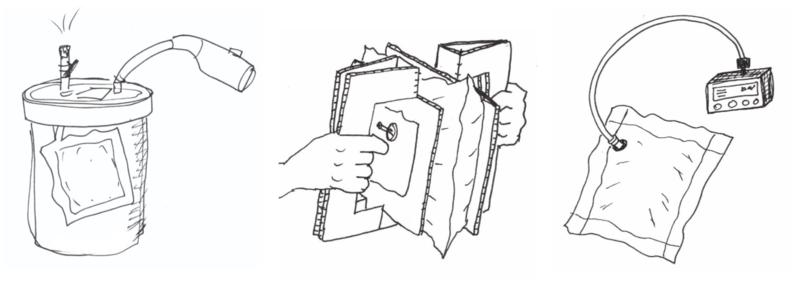Tedlar bags can be an affordable alternative to Summa canisters. They are used for grab sampling (a form of whole air sampling) to take a "snapshot" of an air sample at a specific point in time; they can also be attached to a pump system to take a weighted sample over time. Tedlar bags are used in the following ways:

| BUCKETS | INFLATABLE BAGS | PUMPS |
|---|---|---|
| How it works: The bag sits inside a sealed bucket. A small vacuum sucks air out of the bucket, creating a pressure differential. When the bucket valve is opened the bag inflates, filling automatically with air. | How it works: An evacuated bag that comes with handles. To take a sample, open the valve on the bag and carefully pull the handles to inflate the bag by hand. This is a proprietary system that is only available from certain suppliers. | How it works: The bag is connected to a pump which pulls air through the system and into the bag to take a sample. Like Summa canisters, the pump surface needs to be inert, which adds a step in terms of cleaning and setting up the system. |
| Advantages: Affordable. No direct contact with the vacuum; the sample is taken automatically when you open the valve | Advantages: Affordable; inflatable bags run about $40-60 apiece, vs. $100 for the bucket and $1000 for a pump system. | Advantages: Pump systems can be connected to flow controllers to take a sample over time. Good for taking calibrated samples. |
| Cost: $100-200 | Cost: $40-60 | Cost: $1000 and up |
Once the sample is taken, the bag is removed and sent to a lab for analysis.
** Benefits:**
- Gives you a "snapshot" of what's in the air around you
- More affordable than Summa canisters
- Can be built with parts from the hardware store (bucket monitor)
Limitations:
- Whole air sample: does not measure particles or biological compounds
- Sulfur compounds may react with metal fixtures or fittings in the sampling bags
- GC-MS testing is more expensive than other types of lab analysis
Shipping considerations:
- Air samples degrade quickly in Tedlar bags (1-3 days). Depending on where you are taking your sample, you may need to use rush shipping to get it to the lab in time to analyze it
- Sample bags are sealed and may explode in depressurized cabins (airplanes)
This post is part of the Bucket Monitor project.
For more information, see our introduction and project overview.
Subscribe to the tag "bucket-monitor" to get updates when we post new material.
Subscribe to get updates on this project
Image credit UBC Micrometeorology CC-BY 2.0

0 Comments
Login to comment.